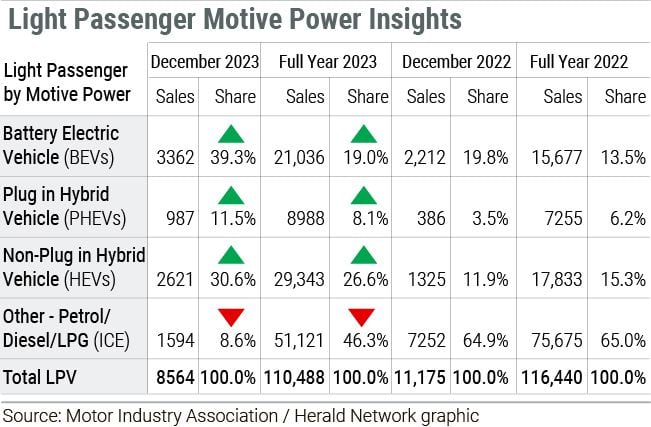
It will soon cost close to $1000 per year to drive your Tesla or Nissan Leaf.
Electric vehicles will lose their long-time exemption from road user charges (RUCs) on April 1, Transport Minister Simeon Brown confirmed this afternoon.
EV owners will be charged $76 per 1000km (the same rate applied to other non-petrol light vehicles; essentially diesel-powered cars), plus admin fees of $12.44 (online) or $13.71 (over the counter) when you pre-pay for a block of 1000km or more..(See bullet points below for the mechanics of the new system..
The AA says the average motorist drives 12,000km per year, which equates to $912 in RUCs, not including admin fees.
“This transition to RUC is about fairness and equity. It will ensure that all road users are contributing to the upkeep and maintenance of our roads, irrespective of the type of vehicle they choose to drive,” Brown said.
The previous National government exempted EVs from paying the charge to encourage their uptake. “This exemption was always intended to end when EVs hit around 2 per cent of the light vehicle fleet and we’re now at that point.”
Both the AA and the MIA (Motor Industry Association) had raised fears of “double dipping” by the Crown in the case of plug-in hybrids (or PHEVs) - which could potentially be charged both RUCs and petrol tax.
Brown said that concern had been addressed by a lower RUC rate for PHEVs, whose owners will pay $53 per 1000km. The partial rate assumes that on average, a plug-in hybrid will consume petrol at a rate of just under three litres per 100km.
Filling a $2b hole
The outgoing Labour Government set March 31, 2024, as the final day of the exemption. Brown said today that he would stick to that date.
Both of the major parties are aware that around $4 billion in revenue is generated each year by RUCs and petrol tax - with around half of that from the latter.
If EVs maintained their RUC exemption as NZ’s fleet electrifies, the Crown would be left with a $2b hole in its books.

Only light EVs (those weighing 3500kg or less) are losing their RUC exemption. Heavy electric vehicles will be hit by RUCs from December 31, 2025.
The imposition of RUCs represents the other boot dropping for EV sellers.
The first was the elimination of the Clean Car Discount - and the associated “ute tax” on December 31.
December saw record EV sales as the discount entered its final days.
“I hope that with the removal of the CCD [Clean Car Discount] that we don’t go too far backwards in our low-emission vehicle sales,” MIA chief executive Aimee Wiley told the Herald last week.
Wiley said boom-and-bust cycles with various regulatory changes made it difficult for dealers as they ordered cars months in advance.
Overall, she supported the elimination of electric vehicles RUC exemption, however.
“They’ve had a free ride. It’s time for EV owners to pay their fair share,” Wiley said.
Although the Clean Car Discount has been wiped, and RUCs imposed, Brown said the Government would subsidise the rollout of 10,000 public chargers by 2030 to encourage EV uptake.
The EV charges announcement came on the same day the news cycle was consumed by the resignation of Green MP Golriz Ghahraman following shoplifting allegations. Brown told the Herald the date of the announcement was long-planned.
The RUCs will mainly be paid by wealthier Kiwis. EV registration figures show the heaviest concentrations of electric vehicles in Remuera and other top-earning suburbs (see table here).
MTA: Spend it on roads
Motor Trade Association chief executive Lee Marshall welcomed the move, which he said was necessary as NZ’s fleet electrified.
“Now the challenge is to ensure that the proceeds of the RUC goes where it’s needed – on-road,” Marshall said.
Weather events of the last 12 months have accelerated the deterioration of our roads, he said.
“The reality is that cyclones and storms are only going to occur more frequently in the future.”
The National Land Transport Fund - to which RUCs contribute - previously went solely to roads.
“In 2020, the law was changed to allow these funds to pay for rail. While rail has an important role to play in our transport network, the principle that road users only pay for roading projects is the correct one, and we trust the Government to follow through on that,” Marshall said.
How do RUCs work?
- RUCs are pre-purchased in blocks of 1000km online or from the likes of VTNZ
- Pure EVs will pay $76 per $1000, plug-in hybrids $53 per 1000km.
- Hybrids that don’t require a charge at the wall, like the Toyota Prius, are exempt. E-scooters, e-bikes and electric mopeds and motorbikes are also exempt.
- An odometer reading must be given the first time you buy a block of RUCs.
- An odometer reading is then taken each time your car gets a warrant of fitness allowing NZTA Waka Kotahi to monitor your figures. If the odometer exceeds the RUCs purchased by the vehicle’s owner, they will be invoiced for any difference.
- There will be a two-month grace period as the new system is phased in.
- Every EV owner will receive a letter from NZTA before April 1 explaining the system.
- An individual can be fined up to $15,000 for providing false RUC records.
- Late payment can incur a 10 per cent penalty on the amount owed.
- Under the RUC Act 2012, owners of vehicles over 3500kg have to install an approved electronic device for recording mileage.
Chris Keall is an Auckland-based member of the Herald’s business team. He joined the Herald in 2018 and is the technology editor and a senior business writer.
Take your Radio, Podcasts and Music with you









